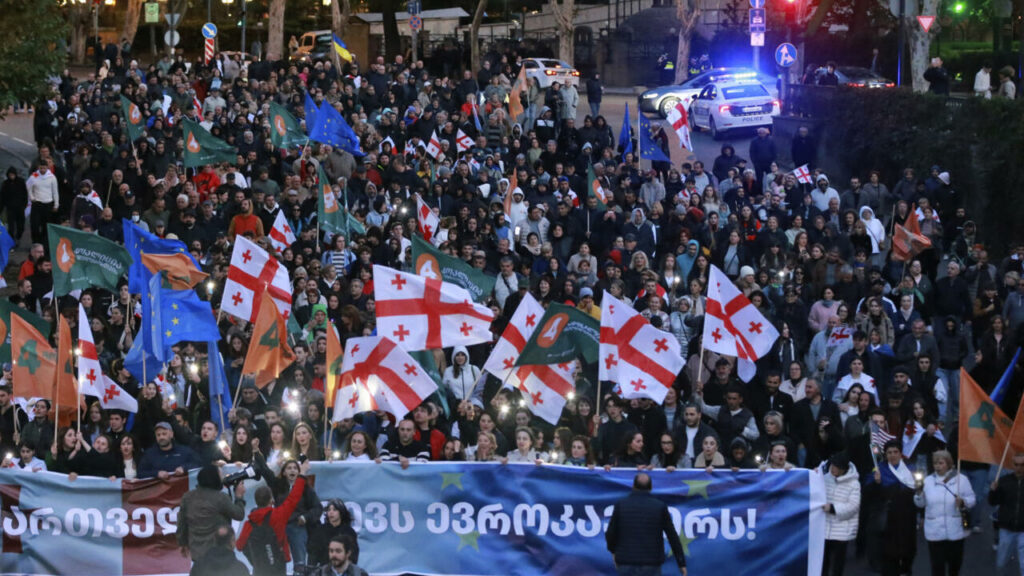For over a decade, Georgia has symbolized a bridge between Eastern Europe and Western ideals. Yet, on 28th November, the Prime Minister’s announcement to suspend EU membership talks until 2028 and refuse EU budgetary assistance dealt a heavy blow to Georgia’s EU perspective.
His decision has widely been interpreted as a halt to Georgia’s EU integration process and sparked widespread protests in the country.
For Georgians, who overwhelmingly support EU membership (around 80% of the population), this move was more than a political setback - it was a blow to a national dream deeply embedded in their identity.
The decision follows the disputed election last October that were marred by allegations of irregularities and voter intimidation. The EU did not recognize the results, pending the final report from the OSCE/ODIHR election observation mission.
As a result, protests have escalated in the 12 days since the announcement, with reports of increasing police brutality. Over 300 protesters have been arrested, and numerous journalists were targeted in a push to suppress media coverage. These events amplified an already tense political climate, with growing fears of further instability or a descent into civil unrest.
In fact, if unrest persists and the government escalates its heavy-handed crackdown, the situation risks spiraling into a deeper crisis - not just for Georgia but for the whole region. The specter of civil war looms, reminiscent of the political rivalries and power struggles of 1991-1993 that left Georgia internally and externally weakened.
A destabilized Georgia would play directly into Russia’s hands. The Kremlin could increase its influence, as a destabilized Georgia would be more susceptible to Russian control. Chaos would completely derail Georgia’s path toward EU and NATO membership, aligning it with Moscow’s geopolitical objectives. Escalation in Georgia could also shift international focus away from Russia's activities in other post-Soviet states.
Lessons learned from Ukraine?
While comparisons between Georgia’s protests and Ukraine’s 2014 Maidan movement have been made, the parallels are limited. Unlike Ukraine, Georgia lacks a united opposition to channel public frustration into a cohesive movement, leaving many citizens feeling politically unrepresented.
This also partly explains why the current protests are mainly driven by civil anger and less by the opposition leadership.
Although the Georgian government’s violent response mirrors tactics used in Kyiv, such as deploying water cannons and tear gas, the scale and intensity of the protests in Georgia remain smaller. Unlike Maidan, which unfolded over months with widespread mobilization, Georgia’s protests are more fragmented.
Furthermore, the government’s swift suppression of dissent contrasts with the delayed response during Maidan, which allowed momentum to build.
It is also crucial to recognize that the election results sparking the unrest are not solely due to manipulation. They also reflect a notable level of support for the government party, Georgian Dream (GD), driven by promises of economic stability. However, deep political polarization - long a hallmark of Georgian politicy - has further fractured public responses to the crisis.
Why Georgia Matters for the EU
The EU cannot afford to treat Georgia’s crisis as a local issue. Georgia’s geopolitical significance cannot be overstated. It is a critical transit corridor for energy pipelines like the Baku-Tbilisi-Ceyhan oil pipeline and the South Caucasus gas pipeline, which are vital for reducing Europe’s reliance on Russian energy.
As a pro-Western nation in the South Caucasus, Georgia plays a key role in promoting peace and counterbalancing Russian influence. Situated at the crossroads of Europe and Asia, Georgia also serves as a transit hub for trade between the Caspian region and Europe.
Th EU must act swiftly and decisively to address Georgia’s political crisis. Yet, any action - whether sanctions, visa suspension, or conditional assistance - must strike a delicate balance.
The new EU High Representative for foreign affairs, Kaja Kallas, has already hinted at "direct consequences" if the Georgian government continues on its current path. While suspending Georgia’s visa liberalization agreement has been floated as an option, such sanctions should be carefully calibrated to target those in power without punishing ordinary citizens.
At the same time, the EU must take a firm stance and adopt a proactive approach, with a strict and targeted response, yet remain vigilant against disinformation campaigns within Georgia that seek to exploit these measures, aiming to erode public trust in the European institutions.
The Baltic countries have taken the lead, becoming the first to impose sanctions and advocating for the EU to adopt tougher measures against Georgia’s leadership.
A proactive approach is also needed in investigating allegations of election fraud. While former High Representative Josep Borrell announced the deployment of a technical mission to Georgia, little is known about its progress or if any mission is planned to take place under the new High Representative.
A strategy that moves beyond rhetoric to tangible, effective action should prioritize immediate stabilization, including a thorough investigation into the electoral irregularities. In the short term, the focus should be on maintaining order while deploying targeted sanctions against those undermining democratic processes.
In the long term, the EU must ensure that Georgia stays firmly on its path toward European integration, reflecting the clear aspirations of the majority of the Georgian people.
The era of passive observation has passed. Georgia requires decisive and immediate EU engagement. Failure to act risks Georgia’s very future and EU’s credibility!


